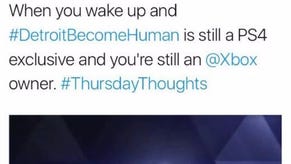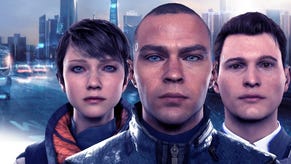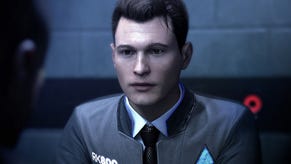I'm not sure what David Cage is trying to say with Detroit
I predict a riot.
I want Detroit: Become Human to have the balls to have something to say, but I'm worried it'll end up being a game about android resistance that sits on the fence.
David Cage, mastermind of divisive PlayStation adventure games Heavy Rain and Beyond: Two Souls, has turned his attention to the telling of a well-worn story: what happens when robots rise up?
The robot revolution is a tale as old as time, but in 2017 and no doubt in 2018, when Detroit is due out, it takes on extra meaning. The downtrodden, the forgotten, the poor and the weak have had enough. Is Detroit, then, a game about what it means to be human in this day and age? Is Detroit about the civil rights movement? I really want it to be, but I very much doubt it.
At E3 last week I sat down with a lovely chap from the developer Quantic Dream, associate game director Gregorie Diaconu, who played through an extended version of the demo Sony showed on stage during its media briefing. He speaks passionately about the French studio's latest modern day choose your own adventure, and stresses it's designed to be about picking the best bits from Heavy Rain and the best bits from Beyond and fusing them together in a story that, this time, promise, holds together.
You can see this demo in the video, below. I won't spend a huge amount of time describing the gameplay on offer here because you can see it for yourself, but I will say Detroit looks more like Heavy Rain than Beyond, which is probably a good thing, since Heavy Rain was okay despite its flaws but Beyond really was a big pile of nonsense.
To that end, expect to see a lot of Heavy Rain in Detroit. The most obvious similarity is in the control scheme. You'll see symbols pop up on screen, and you "play" them with the right stick. In classic David Cage fashion, Detroit shakes the DualShock controller to within an inch of its life. Every button is used in a variety of quick-time events, from mashing X to wrestling a surveillance drone out of the air to pressing and holding four buttons to simulate the concentration the character is putting into opening a door. And yes, you use the controller's gyro and even the touchpad as you flit in and out of gameplay and cutscene.
Diaconu stresses Detroit is the most branching game Quantic Dream has ever made, and the gameplay demo certainly suggests this is the case. There's a decision to be made every 30 seconds, it seems, whether it's to hide from a drone or check it out, to disable a showroom alarm or crash through it, or, at the end of our demo, to execute a cop who's just murdered a bunch of your android friends, or spare his life. These are big ticket decisions, but there are what feels like hundreds to be made over the course of just once set piece.
Ostensibly, more choice and more consequence sounds like a good thing for Detroit, but I can't help but worry that the game will end up spiralling out of control as a result. David Cage's games have always suffered from plot holes, unjustified twists and pacing issues. At this stage Detroit, which tells its story from the perspective of three playable characters, could go one way or the other, but I know what my money's on.
In any case, I'm as concerned about how this branching structure manifests itself just as much as its execution. After Markus frees his android friends from servitude, he must send the humans a message. A quick activation of his "Mind Palace" (yes, it's called his Mind Palace - take that, Sherlock) highlights all the parts of the plaza he can interact with. So, you walk over to, say, a glass window, and decide whether to perform a violent or pacifist action. Be violent and you'll smash it. Be pacifist and you'll tag it. As you do this sort of thing, your android friends follow your lead. If you're being Saturday night Croydon about it, they'll overturn cars and set stuff on fire. If you're being Brighton mum about it, they'll laser tag the place to death, making it look like some neon-drenched street party.
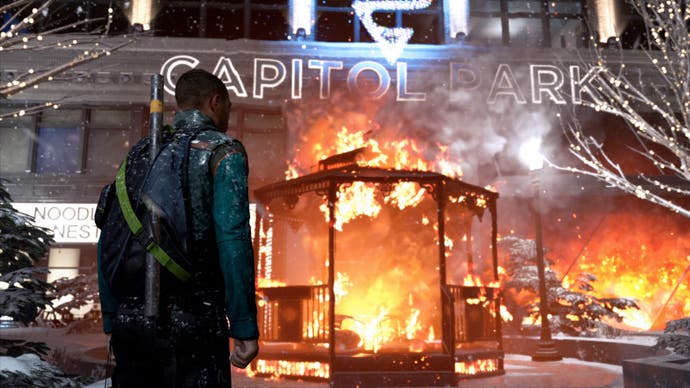
This is a cool set piece, and the music, which ramps up as the plaza gets torn to shreds - or not - certainly helps evoke a sense that something important is happening. But then Detroit ruins the immersion by displaying a morality gauge on the right-hand side of the screen. Each violent action adds points to the red side, each pacifist action adds points to the blue side, with your place on the slider moving left and right accordingly. Do we really need to do Knights of the Old Republic morality again, David Cage? No, we don't. As Quantic Dream repeats, Detroit is a game about choice and consequence, about a complex, branching narrative, about convincing characters and an adult story. And then a morality gauge comes along like a virtual bull in a video game china shop to smash your dreams to bits. You're giving my revolution a high score. Or perhaps it's some commentary on the current red/blue political situation in the UK? (It's not.)
Then there's the dialogue. David Cage has proudly boasted of a 2000 page script for Detroit, but quantity does not mean quality. Markus, played by Grey's Anatomy star Jesse Williams, is a deviant who ran away from his master to join a group of androids called Jericho. They started to band together for survival and want to prove to humanity they're not just broken smartphones, they're actually alive. Somehow, Markus can trigger sentience in androids, simply by touching them. And so he does. He puts his hand on the shoulder of an android and whispers in their ear: "You're awake now. Go to Jericho." It's all a bit, well, creepy, and I'm not sure that's quite the intent.
The dialogue is, at times, Star Wars prequel level bad (and the lip-syncing in my demo was all over the place). After Markus botches the android rescue mission, his cohort North has a go at him:
"How could you get this so wrong? I thought you knew what you were doing?"
"I did what I could! I'm sorry that's not enough for you."
"No it's not enough. This is a war we're fighting with the humans. If we fail they'll destroy us. The fate of our people is in your hands. You have to succeed. You have no choice."
Well, actually North, we do have a choice, because that's how Detroit works. If we fail the story moves on regardless. That's the hook.
Then there's this nugget of dialogue: as Markus and North watch the plaza burn, a sudden moral panic:
"Now humans will have no choice but to listen to us."
"They'll be afraid. Fear feeds hatred."
"I'll take hatred over indifference."
Are North and Markus Padmé and Anakin in disguise?
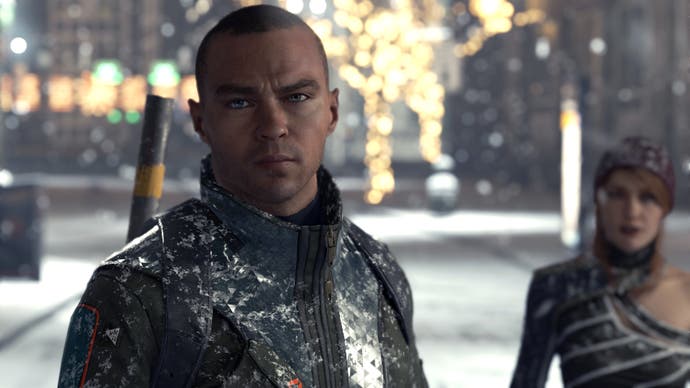
So far, Detroit looks more like an okay attempt at telling a robots rise up story, but I've seen nothing to suggest it gets to the heart of the (still interesting) "what it means to be human" debate sci-fi has for years done a wonderful job of unpacking. I see parallels with HBO's Westworld, whose first season told a cool "androids have had enough" story but ultimately said little more than suffering is what makes us human - and with often eye-rolling dialogue, too. What I'd love to see from Detroit is a bit of Ex Machina about it. Hell, maybe take a page out of the D.A.R.Y.L. playbook.
Throughout it all, I desperately want Detroit to have something to say, to have something to scream, in fact. In an era of ultra safe video game stories, at a time when developers are loath to make any kind of statement for fear of being torn this way and that by internet forum posters, it's much easier to play it safe. I understand that. But I reckon Detroit: Become Human would do well to put itself out there, to leap off the fence, to be the game of our time.
What I suspect is Detroit will be an android resistance game with nothing to say, a game that you'll no doubt enjoy if you liked Heavy Rain. That's probably enough for Sony, but I wonder if it's enough for David Cage.




